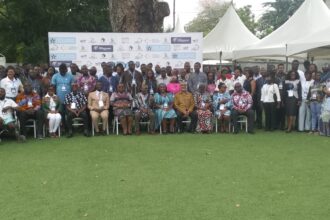Professor John Gatsi, the Head of Finance Department, University of Cape Coast, on Tuesday said the Bank of Ghana (BoG) failed to undertake broader stakeholder consultations before starting the indigenous banks’ recapitalisation exercise.
He said the Central Bank should have engaged in transparent and active debate involving bankers, policy-makers, politicians and other key stakeholders in the banking industry to ensure an alternative policy direction.
He noted that initially, the local banks were told to raise between GH¢250.00million and GH¢290.00million as minimum capital requirement and wondered why the Central Bank suddenly raised the amount to GH¢400million.
He said Parliament, which had powers to approve or disapprove the utilisation of the taxpayers’ funds to support the liquidated banks was not adequately consulted.
The Central Bank has, so far, revoked the operating licences of seven local banks within a year for various financial breaches.
They were; UT Bank, Capital Bank, Beige Bank, Royal Bank, Sovereign Bank, Construction Bank and Unibank Ghana.
Prof. Gatsi raised those concerns at a stakeholder engagement in Accra organised by the Economy Times, a financial newspaper, on the theme; “Ensuring private indigenous participation in our banking sector”.
The forum, provided a platform for key stakeholders in the banking sector to make suggestions on alternative policy direction through which the State can preserve indigenous banks’ participation in the banking sector without compromising the safety of the depositors’ funds.
Prof. Gatsi said the engagement process was weak with some stakeholders not given the opportunity to make inputs into the recapitalisation of the indigenous banks.
He cited the financial crisis that hit Sweden in the early 1990s as a case in point, noting that, the government of Sweden at that time engaged in extensive stakeholder consultations for open, transparent and active debate before rolling out policies to resolve it.
Prof. Gatsi said the Central Bank should be partly blamed for the current banking crisis, adding that it was within its purview to supervise the banks to check financial infractions.
He said it was time the government critically examined the universal banking regime, noting that, it was inappropriate for the Central Bank to grant universal banking licences to all those that applied for them.
He explained that some banks should be given licences to support specific areas of the economy, instead of giving them universal licences to operate.
He said indigenous banks should desist from investing in areas that were not permitted by law, and rather pursue strong corporate governance practices, risk management controls and ensure strong internal audit mechanisms to prevent them from falling foul of the Central Bank’s regulations.
In the wake of the current financial crisis, Prof. Gatsi called for the protection of the indigenous banks since they had supported the small-and-medium scale enterprises over the years, offered employment opportunities to the unemployed graduates and the Ghanaian economy at a whole.
“Government must support indigenous banks that are doing genuine business, especially to those that have not infringed on their core mandate.
“The stimulus package should be given to the private entities on condition in order to protect the taxpayers’ funds.
“We know that our indigenous banks provide financial intermediation, opportunities for job creation and contribute to government revenue and the machinery that supports the economy,” Prof. Gatsi emphasised.
He, therefore, advocated the extension of the time given to banks to meet the minimum capital requirement, noting that, it was not easy to raise that amount within that time frame.
Nana Osei-Bonsu, the Chief Executive Officer of the Private Enterprise Federation, said ideally, Ghana should have at least 15 banks made up of 10 indigenous and five foreign, with sound financial standing that could support the national economy.
He urged the Central Bank to withdraw the licences of auditing firms that gave a clean bill of health to local banks that had breached its financial regulations to serve as a deterrent to others.
He called for regular capacity building of the human resource of banks so that the top-management would make investment decisions that would be in the best interest of the shareholders.
He added that at least 10 per cent of indigenous banks’ shares should be listed on the Stock Exchange to ensure transparency and boost the confidence of shareholders.
Mr Elorm Desewu, the Managing Editor of Economy Times, in an earlier remark, said indigenous banks deserved affirmative action policies to help them to grow; noting that, leaving local banking completely to the dictates of the market forces was undesirable.
“We believe that the huge amounts of state funds being used to restore solvency and ensure adequate capitalisation of the industry could as well be used to give indigenous ownership and a chance to survive into the new dispensation for the ultimate good of the economy as a whole,” he added.
Source: GNA














